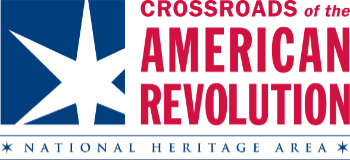Biography People
Charity Britton Full Biography
I was born in 1720 into the prominent Tucker family of Trenton and spent my entire life there fully involved in the community. My brother, Samuel Tucker, was an important merchant and politician while my brother, William, was a highly respected cordwainer (shoemaker), who also served in many public offices. I married first, Henry Bellerjeau, and our first son, Samuel Tucker Bellerjeau, was born in 1738. Henry died in 1746 and I married shoemaker Joseph Britton. At some point I began to operate a tavern at our home and continued to own and operate it after Joseph died in 1755.
Trenton had about a dozen taverns and stage coaches travelling between New York and Philadelphia often stopped at one of them for a meal or for overnight. Trenton was a market town and the county seat of Hunterdon County so many people came to town needing food and lodging. Taverns also provided meeting rooms and might be used for government meetings, court cases, social events, auctions, or celebrations (such as July 4). I had to apply each year for a tavern license in which I promised to provide food and lodging for travelers and others, as well as their horses. I also pledged to keep good order in my house. My Indian King Tavern was a large, two-story frame house with four rooms on each floor, and a large kitchen building attached to it. My property also had a wood house and shed, a two-story stable that could hold more than 40 horses, and many trees bearing fruit. About three miles from the tavern I also had a ten-acre woodlot to supply the large amounts of firewood I needed in my business.
In 1757 and 1758, during the French and Indian War, I provided housing for six British soldiers for 21 weeks and five days, two soldiers for 13 weeks, and three soldiers for a week and five days. Many other Trenton people also housed soldiers. Although we were reimbursed for the expense, to relieve us from the need to board British soldiers, the townspeople asked the colonial government for a barracks to be built in 1758-1759 (it is now the Old Barracks Museum). During the Revolution, my tavern provided meals for army officers travelling through Trenton on their way to join with George Washington’s army. My sons served in the militia and we suffered greatly when the British and Hessians occupied Trenton in December 1776 and two battles were fought in our town. My tavern, on King Street, was in the thick of both battles.
In May 1777, I was ready to partially retire and rented my house to Francis Costigan who applied for a tavern license. The next year, my son, Samuel Bellerjeau, applied for a license and took over the business. During the winter of 1778, the Continental cavalry came to Trenton for winter quarters while Washington’s army was at Valley Forge. A French doctor, Nicholas de Belleville, came with them and treated soldiers at the military hospital in the Barracks. He stayed with a Loyalist doctor, William Bryant, at Kingsbury (now the William Trent House Museum). After the cavalry left Trenton, he returned sometime later to live in Trenton and boarded at my home before marrying my daughter Ann in January 1780. Nicholas became a highly respected citizen known for his excellent medical skills as well as his kind and soothing manner.
My son Isaac took over the family business noting in his July 1779 license application that he “has settled himself in his own house, lately and long occupied by Mrs. Charity Britton as a tavern.” He operated it through the rest of the Revolution. In October 1779, a joint meeting of the General Assembly and Legislative Council met at our tavern and reelected William Livingston as governor of New Jersey. Two days later they met again at our tavern to discuss making further provisions for wounded officers and soldiers and widows and children of soldiers killed. They met at our place other times as well.
In 1782 Jacob Beck, a blue dyer from Germantown, Pennsylvania used Isaac as his agent in Trenton. Beck dyed linen, cotton, and wool to a deep blue and people from the Trenton area needing his services could drop items off with Isaac “at the sign of the Indian King,” and they would be returned in four or five weeks “dyed in the best manner.” Auctions were often held at taverns and in January 1780, Isaac advertised a public auction to sell an almost new scarlet broadcloth coat, a pair of silk stockings, a piece of silver lace, a neat silver mounted sword, a portmanteau, a bound blank day book, and a pair of four-year-old horses fit for a carriage. Unfortunately, we lost our tavern at sheriff’s sale in 1783. I died on April 13, 1790 at Trenton and my descendants continued to live there for many generations.
FURTHER SOURCES
Hunterdon County Tavern Licenses and other documents relating to Charity Britton and other Trenton tavern keepers are available at the New Jersey State Archives.
For more on the Trenton taverns and their experiences in the Revolution see: Kidder, William L., Crossroads of the Revolution: Trenton, 1774-1783. Lawrence Township, NJ: The Knox Press, 2017.
